 64 citations,
January 2004 in “American journal of clinical dermatology”
64 citations,
January 2004 in “American journal of clinical dermatology” Folliculitis is an inflammation of hair follicles that requires proper diagnosis and treatment based on the specific cause.
 57 citations,
April 2002 in “The journal of investigative dermatology/Journal of investigative dermatology”
57 citations,
April 2002 in “The journal of investigative dermatology/Journal of investigative dermatology” Vitamin D receptor is crucial for starting hair growth after birth.
[object Object] 13 citations,
November 2017 in “BMC Veterinary Research” Fusidic acid can be an effective topical treatment for superficial bacterial infections in dogs.
103 citations,
September 2004 in “Clinics in dermatology” Blocked hair follicles cause acne, and studying tiny early acne spots helps understand its severity.
 69 citations,
December 2015 in “Journal of Controlled Release”
69 citations,
December 2015 in “Journal of Controlled Release” Nanocapsules can improve clobetasol delivery to hair follicles, reducing side effects.
 3 citations,
May 2020 in “Journal of The European Academy of Dermatology and Venereology”
3 citations,
May 2020 in “Journal of The European Academy of Dermatology and Venereology” Topical booster improves hair loss treatment effectiveness.
 May 2017 in “InTech eBooks”
May 2017 in “InTech eBooks” Follicular Unit Extraction (FUE) is a popular hair transplant method with minimal scarring that can transplant many grafts quickly and improve appearance and psychological well-being.
 12 citations,
April 2020 in “Facial Plastic Surgery Clinics of North America”
12 citations,
April 2020 in “Facial Plastic Surgery Clinics of North America” Follicular Unit Excision (FUE) is a popular, safe hair transplant method that avoids scars and has a quick recovery, but requires precise surgical skill.
 10 citations,
June 2005 in “The journal of investigative dermatology/Journal of investigative dermatology”
10 citations,
June 2005 in “The journal of investigative dermatology/Journal of investigative dermatology” FP-1 is a key protein in rat hair growth, active only during the growth phase.
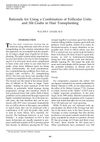 3 citations,
June 2001 in “International Journal of Cosmetic Surgery and Aesthetic Dermatology”
3 citations,
June 2001 in “International Journal of Cosmetic Surgery and Aesthetic Dermatology” Using both follicular units and slit grafts for hair transplants may give better hair density and graft survival.
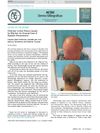 1 citations,
April 2016 in “Actas Dermo-Sifiliográficas”
1 citations,
April 2016 in “Actas Dermo-Sifiliográficas” Wearing a wig caused a woman's skin condition to worsen due to pressure from the wig's fasteners.
 171 citations,
July 2007 in “Journal of Investigative Dermatology”
171 citations,
July 2007 in “Journal of Investigative Dermatology” A substance called DKK-1 increases in balding areas and causes hair cells to die when exposed to DHT.
 89 citations,
November 2014 in “International Journal of Nanomedicine”
89 citations,
November 2014 in “International Journal of Nanomedicine” Using nanostructured lipid carriers to deliver spironolactone could improve treatment for hair loss.
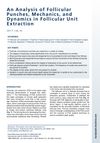 45 citations,
August 2013 in “Facial Plastic Surgery Clinics of North America”
45 citations,
August 2013 in “Facial Plastic Surgery Clinics of North America” Using sharp tools and the right techniques in hair transplant surgery leads to less damage to hair follicles.
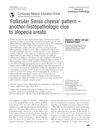 35 citations,
November 2010 in “Journal of Cutaneous Pathology”
35 citations,
November 2010 in “Journal of Cutaneous Pathology” Dilated follicular infundibula and increased catagen/telogen follicles are key indicators for diagnosing alopecia areata.
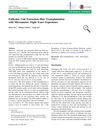 17 citations,
May 2015 in “Aesthetic Plastic Surgery”
17 citations,
May 2015 in “Aesthetic Plastic Surgery” FUE hair transplantation using a micromotor is effective and gives natural results with few complications.
 12 citations,
October 2017 in “Journal of Cosmetic Dermatology”
12 citations,
October 2017 in “Journal of Cosmetic Dermatology” Combining plasma rich in growth factors with hair transplant surgery may lead to faster recovery and better outcomes for hair loss treatment.
 9 citations,
May 2020 in “Journal of Cosmetic Dermatology”
9 citations,
May 2020 in “Journal of Cosmetic Dermatology” Hair restoration surgeons have improved follicular unit excision (hair transplant method) by using innovative tools and techniques, reducing hair damage and increasing success rates.
 9 citations,
July 2017 in “Journal of Drug Delivery Science and Technology”
9 citations,
July 2017 in “Journal of Drug Delivery Science and Technology” Scientists developed a new method to deliver alopecia treatment directly to hair follicles, which could be a promising treatment for hair loss and other hair diseases.
[object Object]  9 citations,
January 2015 in “Current problems in dermatology”
9 citations,
January 2015 in “Current problems in dermatology” New hair transplant method allows for hair regrowth in the donor area and less scarring.
 7 citations,
November 2017 in “Plastic and reconstructive surgery. Global open”
7 citations,
November 2017 in “Plastic and reconstructive surgery. Global open” FUE and SMP together can effectively treat hair loss, needing fewer procedures.
 6 citations,
July 2019 in “Journal of Cosmetic Dermatology”
6 citations,
July 2019 in “Journal of Cosmetic Dermatology” Surgeons make more mistakes in hair transplant procedures as they get tired or do more work.
 4 citations,
September 2019 in “Journal of Cosmetic Dermatology”
4 citations,
September 2019 in “Journal of Cosmetic Dermatology” FUE megasession effectively treats severe hair loss with natural-looking results in one operation.
 3 citations,
April 2021 in “Journal of Cosmetic Dermatology”
3 citations,
April 2021 in “Journal of Cosmetic Dermatology” The micrometer caliper is a reliable tool for measuring hair diameter for FUE surgery.
 3 citations,
June 2005 in “Ophthalmology Clinics of North America”
3 citations,
June 2005 in “Ophthalmology Clinics of North America” Follicular unit transplantation treats hair loss and restores eyebrows with short recovery and natural results.
 1 citations,
June 2016 in “Aesthetic Surgery Journal”
1 citations,
June 2016 in “Aesthetic Surgery Journal” Body hair is a safe and effective option for hair transplants when scalp hair is limited.
 1 citations,
June 2014 in “International Journal of Dermatology”
1 citations,
June 2014 in “International Journal of Dermatology” Pregnancy can trigger follicular mucinosis, which may resolve after delivery.
 March 2024 in “Bioimpacts”
March 2024 in “Bioimpacts” 400 nm particles penetrate hair follicles best, but mouse models aren't fully reliable for human studies.

Follicular unit grafting is a procedure used to treat hair loss, where small hair grafts are placed into the scalp, with future treatments likely to involve smaller incisions and cell-based therapies.
 January 2014 in “Journal of Cutaneous and Aesthetic Surgery”
January 2014 in “Journal of Cutaneous and Aesthetic Surgery” The document suggests that for better patient satisfaction in hair transplants, high-quality photos are needed, and using a narrow donor strip might lead to fewer grafts and dissatisfaction, but filling the scar with FUE grafts and using tranexamic acid can improve results.




























